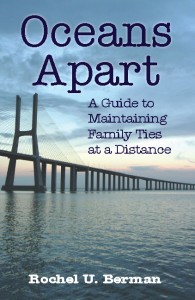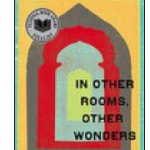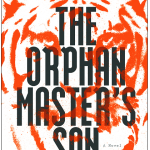Oceans Apart by Rochel U. Berman
 When Family Are Oceans Apart
When Family Are Oceans Apart
Patients in psychotherapy spend a great deal of time talking about family relationships. We examine the nature of the early childhood memories and interactions with parents, siblings and grandparents as well as other close relatives For most people, these relationships are usually the templates for the development of our personality and the strengths and weaknesses of our character formation. Obviously, sometimes there are problems and conflicts, which make us stronger and teach us how to deal with difficult situations. On the other hand, they may lead to symptoms and serious difficulties which will benefit from some form of therapy, usually later in life. . As we get older we can appreciate how important our presence can be to children to whom we are close.. Many of us also come to value ongoing relationships with our children, parents, siblings, grandparents and other close relatives.
But what happens when life circumstances separate us from important people in our lives? In today’s world most people can’t expect to spend their lives in close proximity to their immediate family. While something may be gained by being more independent, something is also lost by drifting apart from people whom you value especially when there are children involved.
A New Book for Family Members When Someone Has Moved Away
This is why I was so interested to see a new book titled Oceans Apart: A Guide to Maintaining Family ties at a Distance by Rochel U. Berman published this year by Ktav Publishing House of Jersey City. Ms. Berman is a M.S.W. social worker currently living in Florida with her husband. She also is a personal friend of mine. In order to write this book she not only has drawn upon her professional experience which includes conducting an extensive number of interviews with various people in 25 different countries , but has drawn upon her own life experience as her son and his family have lived in Israel for the past 20 years.
In her opening chapter she lists five reasons that people move away.
1- Looking for a better life
2- Forced migration
3- Education and career opportunities
4- Changes in marital status
5- Pursuing and ideology
Even those among us who did not need to pursue a better life or migrate to another country, probably know of how that was a major factor in the lives of a close relative in their family in the last one or two generations. With the ease in which we can travel and meet people, it is no longer invariable that people will find their spouse within walking distance of their own home. Going to college, graduate training, medical residency, job recruitment almost always include “ going out of town “ which may lead to permanent livng arrangement away from family. While not mentioned it certainly also applies to members of the military may have to relocate, hopefully with their spouse and children but when deployed they may be separated for a year or two under the most trying circumstances.
The author discussed the reason for moving away by giving specific case vignettes, a technique she uses throughout the book which brings it alive as well as making it very practical. She also concludes each chapter with a section called “ Lessons from Life “ applied to the specific chapter where there are usually ten or more specific suggestions or valuable advice. The ideas in the first chapter alone , I thought qualified as valuable pearls of wisdom. For example there was the suggestions to create photo albums of distant grandparents, uncles, aunts and cousins which should be looked at to reminisce or prior to visits. There also was valuable tried and true techniques for parents to use in dealing with children of divorce.
Living Far Away Doesn’t Mean that You Can’t Be Close
The second chapter was titled Keeping In Touch: Problems and Opportunities, could best be summarized by the opening quote of that chapter “There are many families who live next door to each other who don’t have the relationship we do Mom, we will always be close despite the distance” – A son to his mother following her yearly visit
This was followed by the chapter which probably will be the main reason why people will give this book as a gift to loved ones and that is the chapter titled Grandparenting at a Distance.. The six very practical areas covered are:
1- Staying connected between visits
2- Telephone and other means of communication
3- Preplanning visits with grandchildren
4- Grandchildren visiting alone
5- As grandparents age
6- The effect of distance on relationships.
Each of these topics are elaborated upon through the sue of wonderful vignettes
These are not psychoanalytic case studies although the psychodynamic meaning is usually close to the surface and the practical lesson to be gained is always very clear.
Getting Through The Rough Times
In a subsequent chapter Ms. Berman writes about Getting Through The Rough Times which deals with how to deal with illness and death. This is a subject that she is quite knowledgable and sensitive. She is the author of an earlier very well received book titled, Dignity Beyound Death. Her advice includes suggestions on establishing your own relationship with doctors and caregivers even when you are far away, planning to have final conversations with your terminally ill loved ones and carving out a role with siblings in the care of loved ones.
Sibling Relationships Can Be The Most Difficult
On the bases of my clinical experience, it is frequently the rupture of relationship with siblings which can be the most painful and difficult to heal. I am speaking of situations where the parties are not even separated by a great distance. Therefore it is interesting to see how the author addressed techniques for maintaining ties with distant sisters and brothers as well as distant nieces, nephews and cousins. I believe that many of the lessons from life in these areas could also well be applied to relationships, which are not oceans apart. Interesting also is the discussion about the importance of family traditions and rituals as well as how to share celebrations even when separated and how to deal with missed celebrations. This includes this issue of the cultural divide and discussion of relating to family members who now have different traditions than the ones with which they grew up. Once again, there is great application for these ideas even to people who live in close proximity.
Creative Use Of Technology
I loved the last chapter which was written by the author’s husband George Berman and that is the one titled , Creative Uses of Technology . He clearly is an expert in communication and is comfortable in many modes which of course not only includes the telephone but Internet Video, Instant Messaging and family Websites and blogs. Obviously a chapter such as this one becomes outdated the day that it is written due to constant innovations in social media.
However, the message of this book is definitely current and is becoming more pertinent every year as we become a global society. It should be a great psychological tool for the mental health of those who in one way or the other are oceans apart.
Take Five With the Author
Dr. Blumenfield asks Ms. Berman 5 Questions
TAKE FIVE WITH THE AUTHOR
Why did you decide to write the book?
For the past 20 years I have struggled to maintain family ties with my son, daughter-in-law and four grandchildren who live in Israel. This led me to research the network of distant family relationships with 70 people from 25 different countries. Oceans Apart tells their stories and describes the courageous and creative responses to the challenges they face.
Are you concerned that the application of some of the suggestions made in the book might be considered as being too intrusive to the distant family?
It’s true that some people move far away because they want to get away from family so that they can develop their own lives. This, however, wears thin after a while, and most of them wish, at some point, to reconnect with their roots. I believe that in order to develop meaningful and lasting relationships at a distance, one must be proactive, plan ahead and be specific in terms of goals and objectives.
Do you feel that anything has been lost since people rarely sit down to write long letters anymore and instead rely on more instant communication?
Email and text messages tend to convey only information. What’s missing from them, that is embedded in a long letter, is the contemplative and reflective aspects of what’s going on in one’s life. While this can be done via email, unfortunately, we rarely take the time to do it.
If it is only practical to make one visit to a bereaved far away family member, would a more leisurely visit several weeks after the death be better than a short condolence visit immediately after the death or attending the funeral?
There are several issues that need to be considered, namely the needs and expectations of the bereaved, your needs as well as family and/or religious customs. This is something that should be discussed with the bereaved family at the time of death or in advance if it appears that death is immanent.
You have written very effectively about death and separation. What is going to be your next project?
I am coordinating a half-day seminar on “Families at a Distance” that my synagogue is sponsoring for the entire community including people of all denominations and faiths. The centerpiece of the seminar will be five concurrent workshops led by mental health professions. The purpose of this innovative endeavor is three-fold: To ensure participants that they are not alone in their struggles; to share information; and to seek solutions that they will implement going forward.













